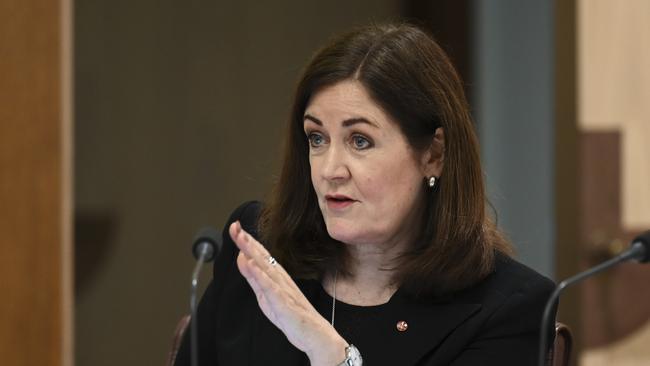Labor student visa go-slow ‘favours elite unis’: Coalition
The Albanese government’s slow down of student visa processing has penalised regional and smaller universities, says the Coalition’s Sarah Henderson.

The Coalition has accused Labor of causing “unprecedented economic harm” to many universities and other education providers by slowing down international student visa processing.
Opposition education spokeswoman Sarah Henderson said the federal government’s move to slow down processing and increase the rate of visa rejection had “failed to safeguard regional and smaller universities, as well as private higher education providers”.
In a letter sent on Tuesday to Education Minister Jason Clare, Senator Henderson said the visa impact had not been spread fairly across the higher education sector.
“Rather than reduce international student numbers equitably and transparently, your government appears to be protecting only a small number of elite universities such as the University of Sydney where 32,800 international students are enrolled this semester, comprising 47 per cent of all students.,” she wrote to Mr Clare.
The government began the visa slowdown last December by prioritising visa applications from students enrolling at education institutions with the least visa risk, which in practice meant favouring Group of Eight and other high-ranking universities that attracted Chinese students.
It penalised lower-ranking universities and private colleges with higher visa risk ratings that catered to students from India and other south Asian countries, who were more likely to breach visa conditions.
The result has been that universities and colleges enrolling large numbers of south Asian students received more visa rejections.
This led to many of them being given higher risk ratings when visa risk levels were reviewed last month, thus placing them at an even greater disadvantage. Some universities are now reported to be limiting, or even refusing, applications from Indian students.
In her letter, Senator Henderson said it was incumbent on Mr Clare to “ensure Australia’s international student policy settings are both transparent and equitable”. She said the government’s approach was not improving Australia’s international student reputation, as it had claimed, but instead “causing immeasurable harm”. Senator Henderson pointed to government moves last year to build strong education links with India.
The slowdown in visa processing, particularly of Indian students, was now “jeopardising our relationship with India”, she said, because if broke a commitment by Anthony Albanese to Indian Prime Minister Narendra Modi to process Indian student visas in a timely and efficient way.
Senator Henderson told The Australian that student numbers did need to be reduced, but without “favouring the big end of town”.
After receiving the letter Education Minister Jason Clare said he was surprised there was not bipartisan agreement on international student policy. He said the government was “acting to strengthen integrity in the sector”.
International Education Association of Australia CEO Phil Honeywood said the Coalition was responsible for many of the problems in international education. “Many of the policy challenges currently being faced are a direct result of the lack of consultation that occurred under the previous government,” he said.
“Clearly stakeholders are looking forward to seeing some actual policy relevant to our sector from the Coalition and other political parties.
“We have continued to get mixed messages from these parties regarding their support, or otherwise, of our $48bn (international education) industry.”
A spokeswoman for the University of Sydney said the university had seen moderate growth in international enrolments this year compared to last year.
“The recent changes in visa processing, and issues all providers experienced earlier this year around visa delays, has impacted the entire sector,” she said.
“This has been very disruptive to highly capable young people from around the world who had paid their visa application fee and chosen to come to Australia for their studies.”




To join the conversation, please log in. Don't have an account? Register
Join the conversation, you are commenting as Logout